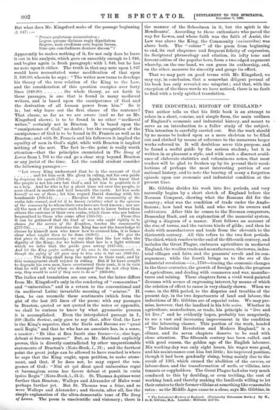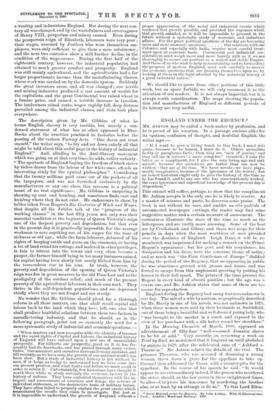THE INDUSTRIAL HISTORY OF ENGLAND.* THE author tells us that
his little book is an attempt to relate in a short, concise, and simple form, the main outlines of England's economic and industrial history, and meant to serve as an introduction to a fuller study of the subject. This intention is carefully carried out. But the work should by no means be looked upon as a mere skeleton to be filled out and clothed by means of reference to the numerous larger works referred to. It will doubtless serve this purpose, and be found a useful guide by the serious student; but it is written in so pleasant a style, and with such a discreet avoid- ance of elaborate statistics and voluminous notes, that most readers will be glad to freshen up by its perusal their recol- lections of perhaps the most interesting portion of our national history, and to note the bearing of many a forgotten episode upon our economic and industrial condition at the present time.
Mr. Gibbins divides his work into five periods, and very naturally begins by a short sketch of England before the Norman Conquest, showing what the Romans did for the country ; what was the condition of trade under the Anglo- Saxons ; how land was held, and who were its owners and cultivators. After this he comes to the Norman conquerors, Domesday Book, and an explanation of the manorial system, giving a diagram of a manor. Next follows an account of the rise of towns, and the various kinds of gilds ; and then he deals with manufactures and trade from the eleventh to the thirteenth century. All this refers to the two first periods. The third, which reaches to the end of the fifteenth century, and includes the Great Plague, embraces agriculture in mediaeval England, the woollen trade and manufactures, the towns, indus- trial villages and fairs, and the peasants' revolt and its con. sequences ; while the fourth brings us to the eve of the industrial revolution—i.e., 1760—tracing the economic changes in the three centuries, the growth of foreign trade, the progress of agriculture, and dealing with commerce and war, manufac- tures and mining. These chapters form a vivid word-painted diorama with scenes of engrossing interest, by means of which the relation of effect to cause is very clearly shown. When we come, in the fifth period, to the disputes and troubles of the present day, in the two departments of land and labour, the inductions of Mr. Gibbins are of especial value. We may pre- mise, however, that the landlord is his bete noire. Whether in agriculture, manufacture, or trade, his principle is " live and let live ;" and he evidently hopes, probably too sanguinely, to see a vast and increasing improvement in the condition of the labouring classes. This portion of the work, headed " The Industrial Revolution and Modern England," is a climax, and its seven chapters deserve to be read with close attention. The fifteenth century has been called, and with good reason, the golden age of the English labourer. His working-day was only eight hours, his wages were good, and his maintenance cost him but little; his improved position, though it had been gradually rising, being mainly due to the revolt of 1381, which caused the abolition of the coreges, or labour-dues, and the transformation of serfs, or villeins, into tenants or copyholders. The Great Plague had also very much conduced to this by doubling, or even trebling, the cost of working land, and thereby making the landlords willing to let their estates to their former villeins at something like reasonable rates : so the Middle Ages came to a close, says Mr. Gibbins, in
• The Industrial History of England. (University Extension Borten.) By H. de B. Gibbins, M.A. London ; Botha= and Co.
a wealthy and industrious England. But during the next cen- tury all was changed, and by the wastefulness and extravagance of Henry VLII., pauperism and misery ensued. Even during the prosperous reign of Elizabeth, labourers were very poor ; their wages, assessed by Justices who were themselves em- ployers, were only sufficient to give them a mere subsistence ; and the next two centuries show a still further decline in the condition of the wage-earner. During the first half of the eighteenth century, however, the industrial population had attained to much greater comfort and prosperity. England was still mainly agricultural, and the agriculturists had a far larger proportionate income than the manufacturing classes, whose work was carried on by the domestic system. Suddenly the great inventors arose, and all was changed ; our textile and mining industries produced a vast amount of wealth for the capitalists, and the great Continental war raised wheat to a famine price, and caused a terrible increase in taxation. The landowners raised rents, wages rapidly fell, deep distress prevailed among the industrial classes, and riots took place everywhere.
The description given by Mr. Gibbins of what he terms English slavery is very terrible, but merely a con- densed statement of what has so often appeared in Blue- Books about the cruelties practised in factories before the passing of the various Factory Acts. " One dares not trust oneself," the writer says, " to try and set down calmly all that might be told about this awful page in the history of industrial England." And, alluding to the Anti-Slavery movement which was going on at that very time, he adds, rather unfairly : " The spectacle of England buying the freedom of black slaves by riches drawn from the labour of her white ones, affords an interesting study for the cynical philosopher." Considering that the twenty millions paid came out of the pockets of all the taxpayers, and was not furnished exclusively by the
manufacturers or any one class, this sarcasm is a political taunt of no real significance. Mr. Gibbins is unsparing in showing up cant and humbug, and sometimes finds cant and humbug where they do not exist. He endeavours to show, by tables taken from Rogers's Six Centuries of Work and Wages,
that despite all the Jubilee talk of the " progress of the working classes" in the last fifty years, not only was their material condition at the beginning of Queen Victoria's reign one of the deepest poverty and degradation, but that even in the present day it is practically impossible for the average workman to save anything out of his wages for the time of sickness or old age ; while the farm-labourer, debarred of his
rights of keeping cattle and geese on the commons, or having a bit of land round his cottage, and mulcted in other privileges, is fain to retreat into the towns and very often become a
pauper, the farmer himself being in too many instances ruined, his capital having been slowly but surely filched from him by the tremendous rise in his rent. In truth, however, the poverty and degradation of the opening of Queen Victoria's reign was due in great measure to the old Poor-Law and to the prodigality of the outdoor relief ; and much of the present poverty of the agricultural labourers is their own work. They thrive in the self-dependent populations, and are depressed chiefly where they are not frugal and not sturdy.
No wonder that Mr. Gibbins should plead for a thorough reform in all these matters, one that shall recall capital and labour back to the land which they have left, one also that
shall produce healthful relations between these two factors in manufacturing industry, and that he should, as in the following paragraph, point out so earnestly the need for a more systematic study of industrial and economic questions :—
" When masters and men recognise alike the identity of interest and the equal rights of Capital and Labour, the industrial history of England will have entered upon a new era of unassailable prosperity. For hitherto our prosperity, great as it is, has fre- quently had its drawbacks, and has passed through many vicissi- tudes. Our ancestors and ourselves have made many mistakes, and till recently, as we have seen, the growth of our national wealth has been slow. But a study of industrial history is not without its uses, if it helps us to-day to understand how we have come into our present position, and what faults and follies we must avoid in order to retain it. Unfortunately, few historians have thought it worth their while to study seriously the economic factors in the history of nations. They have contented themselves with the in- trigues and amusements of courtiers and Kings, the actions of individual statesmen, or the destructive feats of military heroes. They have often failed to properly explain the great causes which necessitated the results they claim to investigate. But just as it is impossible to understand the growth of England without a
proper appreciation of the social and industrial events which rendered that growth possible, and provided the expenses which that growth entailed, so it will be impossible to proceed in the future without a systematic study of economic and industrial affairs. For the great political questions of the day are becoming more and more economic questions Our relations with our Colonies, and especially with India, require most careful treat- ment upon an economic basis. Commercial and industrial con- siderations must weigh more and more heavily with us if we are thoroughly to secure our position as a united and stable Empire. And those of us who wish to help in maintaining and in forwarding the progress of modern England, must seek carefully to answer the economic questions that are pressing themselves upon us, by looking at them in the light afforded by the industrial history of a great industrial nation."
We should like to quote from other portions of this little work, but as space forbids, we will only commend it to the attention of our readers. It is not always impartial, but it is always worth consideration. The maps showing the popula- tion and manufactures of England at different periods of its history are very useful.























































 Previous page
Previous page